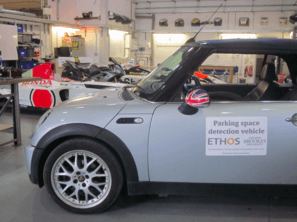In September 2015 Ethos participated in the excellent Smart Oxford Challenge event, hosted by Adam Leach from Nominet. Ethos showcased our Future Cities Parking platform which uses new and legacy parking sensors, a linked open data system and machine learning to predict where parking spaces will be. This allows drivers to plan the best route to a known available parking space, helps cities reduce congestion and as a result improve air quality. Coincidentally one of the other teams, led by Peter Ball from Oxford Brookes University, was demonstrating their vehicle based parking space detection system.
The Smart Challenge event format had both our teams presenting the merits of our different approaches to dealing with the city parking problem. Over the course of the day it became clear that the fixed and mobile parking detection approaches, rather than being competitive, are actually entirely complementary.
Fixed sensors are great for short stay parking areas, where wide area scanning technologies such as parking scanning vehicles are ideal for longer stay areas. As a result we formed an alliance, and today we have completed sensor integration of the Parking Space Detection research vehicle at Oxford Brookes, which connects to the Future Cities Parking platform. Data from the vehicle feeds into our platform, is validated, and the data is curated and added to the composite picture, of real time, historic prediction, and other wide area scanning technologies, to maintain a view of parking occupancy across the UK.
Ethos has built a network of sensors covering 5500 on and off street parking spaces in Guildford, UK and will be evaluating the performance of the vehicle based system against those fixed sensors. The Future Parking platform also has data feeds from cities and towns across the UK (currently over 200,000 spaces) and we look forward to researching and validating the performance of the vehicle based system in many different urban environments.
